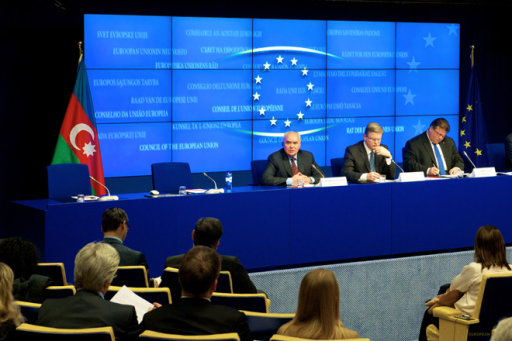EU-Azerbaijan Cooperation Council holds regular meeting in Brussels

By Nigar Orujova
Azerbaijan intends to diversify its export to the European Union
countries, Azerbaijani Deputy Foreign Minister Mahmud Mammadguliyev
said on December 9.
He made the remarks at a press conference following the 14th
meeting of the EU-Azerbaijan Cooperation Council in Brussels.
Azerbaijan holds the rotating presidency of the council's meeting.
The current level and prospects of cooperation between Azerbaijan
and the block were discussed at the meeting. Azerbaijani part was
represented by Mammadguliyev, while the EU was represented by the
current chairman Linas Linkevicius, and EU Commissioner for
Enlargement and European Neighborhood Policy, Stefan Fule.
"We discussed the part of the association agreement concerning trade and development of trade relations between the EU and Azerbaijan as part of the document," Mammadguliyev said.
He went on to note that relations are being successfully developed between Azerbaijan and the EU in this field.
"The EU is one of the largest trading partners of our country. More than 40 percent of Azerbaijan's foreign trade turnover falls to the EU countries. Of course, most of the trade turnover with Europe comes from oil and oil products," he explained.
"We also hope that there will be gas trades in the future. Azerbaijan intends to develop and diversify exports to increase non-oil sector's share in the general trade turnover with the EU," Mammadguliyev said.
He also stressed that cooperation with the EU is one of the top priorities of Azerbaijan's foreign policy, adding that Baku continues steps toward modernization and is ready to study the best practices of the EU.
EU's Chairman Linkevicius, for his part, said that the relations between the EU and Azerbaijan are developing dynamically.
"We are pleased to see the EU and Azerbaijan coming closer," he said.
Linkevicius also said that the EU-Azerbaijan energy cooperation is developing dynamically. In this regard, the EU looks forward to the final investment decision on Shah-Deniz consortium on December 17. The parties also agreed to continue discussions on the Trans-Caspian gas pipeline.
EU Commissioner for Enlargement and European Neighborhood Policy, Stefan Fule also noted the importance of visa facilitation agreement signed with Azerbaijan at the Vilnius summit in November-end.
"People-to-people contacts and the facilitation of visa regime are important points of our cooperation," he explained.
"The EU intends to expand cooperation with Azerbaijan at all levels. We would like to accelerate the pace of the negotiations on association," he said.
Fule also added that a readmission agreement will be most likely signed next year and called on Azerbaijan to intensify steps towards the country's accession to the WTO, and to comply with international obligations regarding the observance of fundamental freedoms in the country.
"In all issues, Azerbaijan can count on the support of the EU," Fule said.
The two sides also touched to the most serious problem for Azerbaijan - Nagorno-Karabakh conflict.
"This unsolved conflict has an impact not only on the region, but also beyond its borders. Azerbaijan evaluates the support of the EU for OSCE Minsk Group, but we believe that the EU can play a stronger role in the resolution of the conflict," Mammadguliyev said.
In turn, Linkevicius welcomed the recent meeting of Azerbaijani and Armenian presidents in Vienna and noted that the resolution of the Nagorno-Karabakh conflict is one of the foreign priorities of the EU and Brussels is willing to do more to support the OSCE Minsk Group.
Earlier in December, the EU and Azerbaijan officially launched a Mobility Partnership, a Joint Declaration establishing a framework for future cooperation in the field of migration and mobility, which is another step towards bringing European and Azerbaijani citizens closer.
The partnership provides a flexible and non-binding framework for ensuring an effective management of people's movement between the EU and a third country.
The meetings of the EU-Azerbaijan Cooperation Council are held once a year on the ministerial level and are part of the political dialogue between the sides, coordinating implementation of the agreement on cooperation and partnership. The agreement between Azerbaijan and EU came into force in 1999.
Here we are to serve you with news right now. It does not cost much, but worth your attention.
Choose to support open, independent, quality journalism and subscribe on a monthly basis.
By subscribing to our online newspaper, you can have full digital access to all news, analysis, and much more.
You can also follow AzerNEWS on Twitter @AzerNewsAz or Facebook @AzerNewsNewspaper
Thank you!
